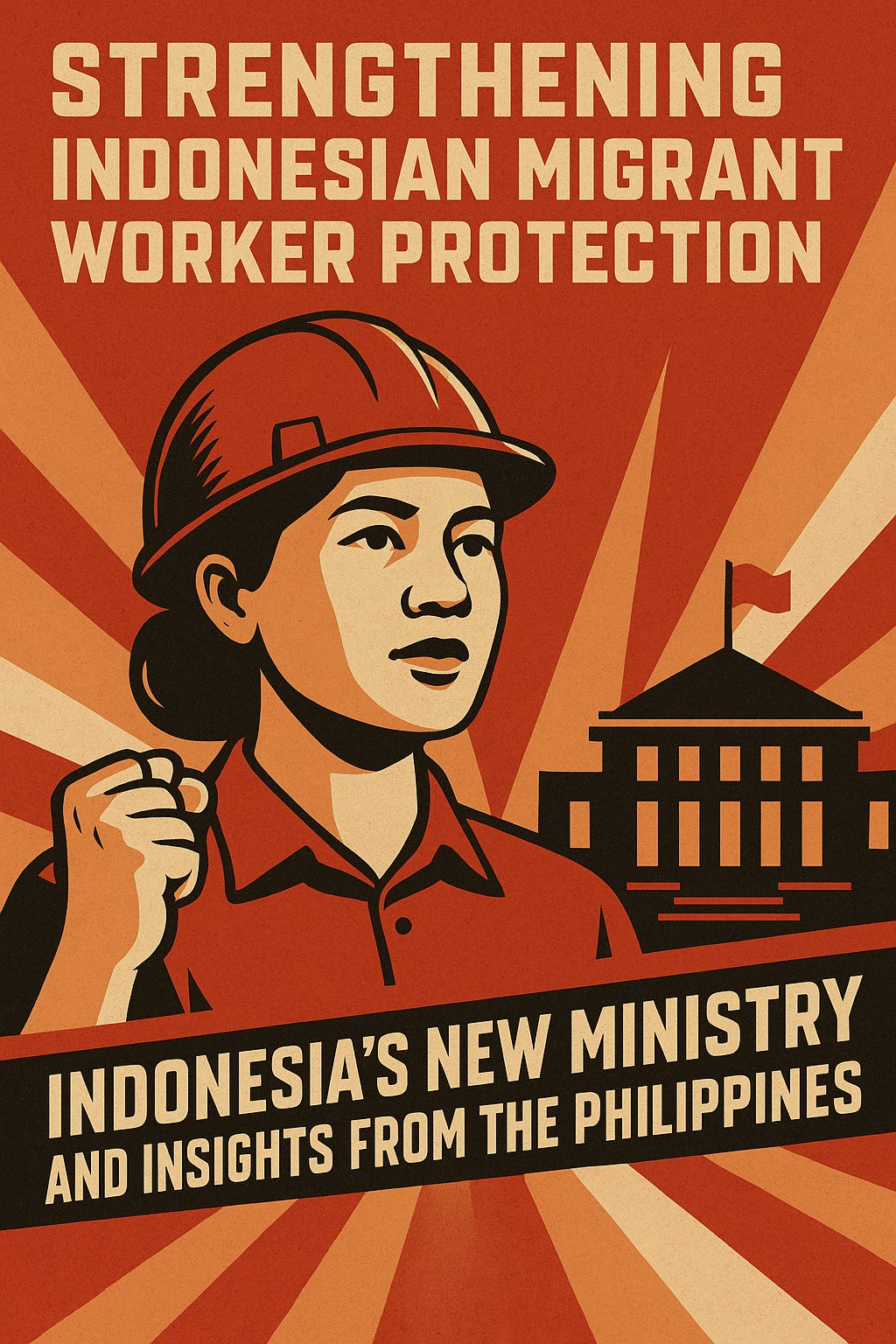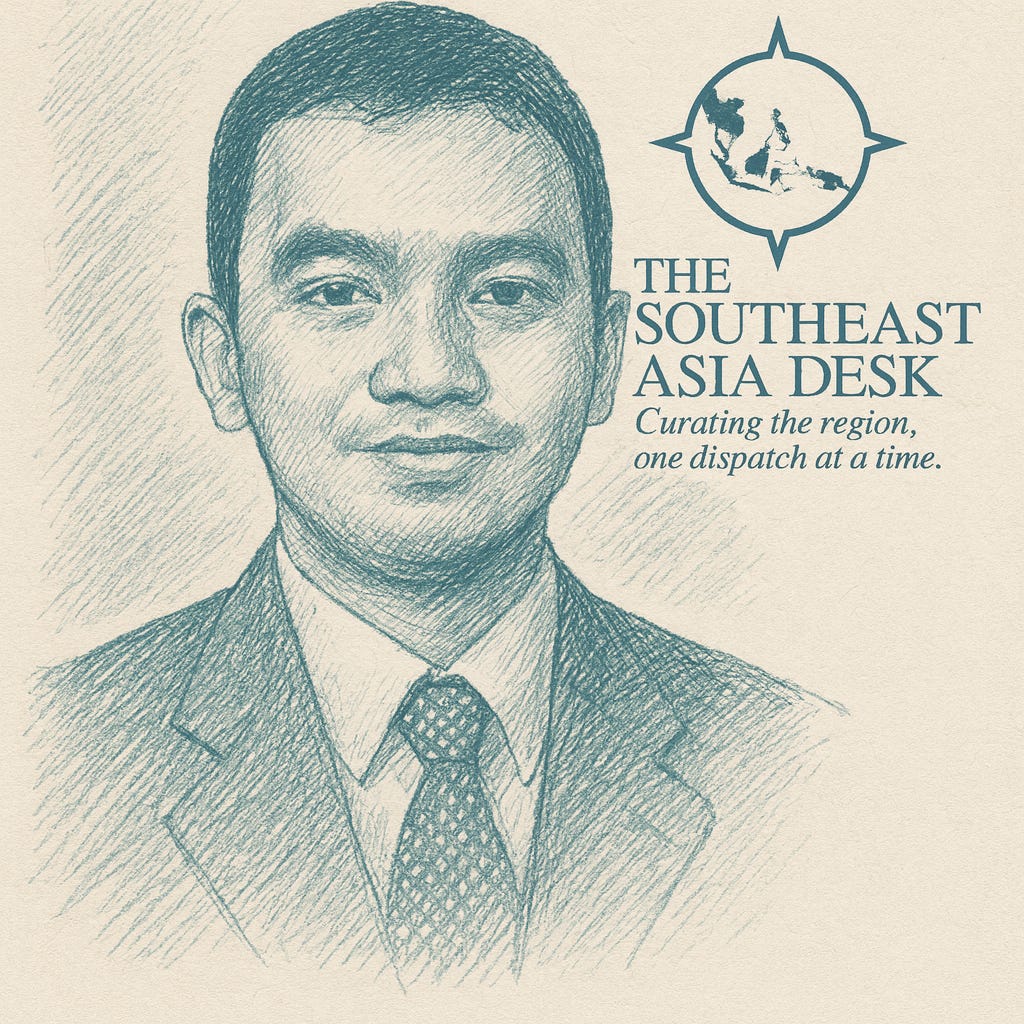Strengthening Indonesian Migrant Worker Protection: Indonesia's New Ministry and Insights from the Philippines 🤝🇮🇩🇵🇭
Mochamad Alvin Dwiana Qobulsyah, Lecturer, Department of International Relations, BINUS University
On the evening of October 20, 2024, Indonesia's newly inaugurated President, Prabowo Subianto, announced that the Ministry for the Protection of Indonesian Migrant Workers had been officially listed as a new ministry in his cabinet.
This is a new phase for Indonesian migrant workers' protection, which was previously taken care of under the names of the Indonesian Migrant Workers Protection Agency (BP2MI), Indonesian Migrant Workers Protection and Placement Agency (BNP2TKI), and the Ministry of Manpower, which also carries some functions on Indonesian Migrant Workers' affairs.
Will the new Indonesian ministry on migrant worker protection become a clear path for the interests of Indonesian migrant workers in the future?
The Two Focuses
Minister for the Protection of Indonesian Migrant Workers/Head of BP2MI, Abdul Kadir Karding, shared that President Prabowo outlined two key focuses on protecting Indonesian migrant workers.
Eliminating exploitation at all stages, from pre-departure to reintegration. ✊
Expanding placement opportunities abroad. 🌏
President Prabowo emphasized the importance of increasing foreign exchange earnings from migrant workers, with remittances being the second-largest contributor after oil and gas. 💸🌍
These remittances from Indonesian migrant workers reached 135.9 trillion rupiahs in 2022 and rose sharply to 227 trillion rupiahs the following year (BP2MI, 2024).
The Institutional Structure
Deputy Minister Christina Aryani highlighted the institutional structure of the newly established Ministry for the Protection of Indonesian Migrant Workers/BP2MI, which is modeled after agencies such as BKKBN and BAPPENAS.
It will have four directorates:
Promotion and Utilization of Overseas Employment Opportunities 🌐
Placement 📍
Protection 🛡️
Empowerment 💪
Programs will be integrated with other ministries under the Coordinating Ministry for Community Empowerment, including the Ministries of Cooperatives, MSMEs, and Creative Economy.
Additionally, Nanik Murwati of KemenPAN-RB noted the transfer of responsibilities, such as job training and recruitment, from the Ministry of Manpower to the BP2MI as a natural progression of its establishment (BP2MI, 2024).
The 100-Day Program Plan
In the 100-day program plan of the ministry, several points were listed, including:
The expansion and improvement of the job market for prospective Indonesian Migrant Workers (CPMI) in the United States, Canada, and Germany; 🌎🇺🇸🇨🇦🇩🇪
Preparation of the workforce insurance (BPJS Tenaga Kerja) program for Indonesian migrant workers; 🛡️
Expansion of the People's Business Credit (KUR) program for financing CPMI programs with KUR for capital and mortgages; 💳🏠
Simplification and integration of one-stop services for processing CPMI documents in the Public Service Mall; 🏢
Improving governance of registration, supervision & guidance of Indonesian Migrant Worker Placement Companies (P3MI); 📑
The establishment of a rapid reaction team for handling problems of Indonesian migrant workers; 🚨
For these protection efforts to be carried out domestically and abroad, KP2MI will establish a Rapid Response Team to address the issues faced by Indonesian migrant workers.
At the central and regional levels involving elements of the Regency/City Government, Immigration, Law Enforcement Officials, and Migrant Worker Activists (BP2MI, 2024).
Mirroring the Philippines?
This transformation in migrant workers' protection institutions can also be observed through the Philippines' experience, where, previously, the labor migration of Filipino nationals was heavily regulated by the Philippine government through three major institutions.
The first institution is the Philippine Overseas Employment Administration (POEA), which regulates the overseas recruitment and employment industry.
The second institution is the Overseas Workers Welfare Administration (OWWA), the lead agency that seeks to promote the well-being and welfare of member migrants and their families. 🤝
Finally, there are labor attaches sanctioned at embassies, consulates, and satellite Philippine Overseas Labour Offices (POLOs) abroad to aid migrants in host countries. 🌍
Later, in 2022, under President Rodrigo Duterte, the Philippines Department of Migrant Workers (DMW) was established.
The newly established DMW now assumes and performs all the powers and functions of the seven merged agencies, namely:
The Philippine Overseas Employment Administration (POEA);
The Office of the Undersecretary for Migrant Workers' Affairs (OUMWA) of the DFA;
The International Labor Affairs Bureau (ILAB) and all Philippine Overseas Labor Offices (POLO) under DOLE;
The National Maritime Polytechnic (NMP);
The National Reintegration Center for OFWs (NRC) under the OWWA;
The Office of the Social Welfare Attaché (OSWA) under the DSWD.
The DMW is mandated to facilitate the overseas employment and reintegration of Filipino workers while considering the national development programs of the National Economic and Development Authority.
It is also tasked to promote the empowerment and protection of OFWs through continuous training and knowledge development (The Philippines Department of Migrant Workers, 2024).
Lessons Learned from The Transformation
The transformation of Indonesia's Ministry for the Protection of Indonesian Migrant Workers and its comparison to the Philippines' Department of Migrant Workers reveal similarities in institutional restructuring aimed at enhancing protection for migrant workers.
Both Indonesia and the Philippines aim to consolidate previously scattered functions under a unified framework for improved efficiency and governance.
Indonesia's approach, which centralizes various agencies into a new ministry, mirrors the Philippines' 2022 formation of the Department of Migrant Workers, which absorbed seven agencies.
However, Indonesia's model integrates programs with other ministries, emphasizing community empowerment, whereas the Philippines focuses on reintegration and aligning national development.
Both frameworks emphasize protecting migrants at all stages and promoting overseas employment, reflecting their reliance on migrant remittances for economic benefits.

Mochamad Alvin Dwiana Qobulsyah is a lecturer and faculty member of the Department of International Relations at Bina Nusantara (BINUS) University, Jakarta. He also served as a Subject Content Specialist in Media and International Politics, and as a Research Fellow at the Centre for Business and Diplomatic Studies (CBDS) at the same institution.
He completed his master's degree (with high honours) in international studies, majoring in international cooperation at the Graduate School of International Studies, Seoul National University, Seoul, Republic of Korea.
Previously, he earned his bachelor's degree in political science, with a concentration in comparative politics and Indonesian political studies, from Universitas Indonesia in Depok, Indonesia. His research interests are focused on migration studies, global media studies, urban studies, and area studies related to Southeast Asia and East Asia.
Currently, he also works as managing editor for The Southeast Asia Desk, a Jakarta-based regional news lab that covers Indonesia and ASEAN-related issues.
He will serve as a Regional Pundit for The Southeast Asia Desk, focusing on issues related to international migration, global civil society, and East Asia-Southeast Asia area studies.
Disclaimer: This article was previously published in BINUS University Center for Business and Diplomatic Studies (CBDS) Commentaries No.5/2024, in November 2024. The re-publication is under the author’s consent. All Rights Reserved.
(QOB)



